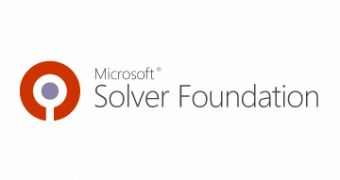Version 3.1 of the Microsoft Solver Foundation will be launched in September 2011, according to the Redmond company. Nate Brixius, the boss of the Microsoft Solver Foundation team, notes that the software giant has taken into consideration feedback it received from customers and partners when putting together the upcoming release.
A specific availability deadline wasn’t provided just yet, but Brixius detailed some of the enhancements that Microsoft Solver Foundation 3.1 brings to the table.
Microsoft has worked to boost performance, expand support, deliver more samples for developers, improve the Excel add-in, etc.
For those not familiar with the technology, the company describes Solver Foundation as a .NET library designed to simplify mathematical programming and optimization.
“Microsoft Solver Foundation 3.1 provides a new NelderMeadSolver class to support nonlinear programming. NelderMeadSolver is suitable for unconstrained or variable-constrained models, and is capable of handling nonconvex or nondifferentiable goals. NelderMeadSolver is the new default nonlinear programming solver for Microsoft Solver Foundation,” Brixius said.
“Solver Foundation Services (SFS) provides several new methods to make it easier to build large parameterized models. The Set class includes a SetBinding method to make it easier to create sets based on external data. New overloads for SetBinding provide better performance and flexibility. The OML modeling language has been extended to support inline Set definition,” he added.
Devs making the jump to Solver Foundation 3.1, will now be able to take advantage of more samples than in previous releases, the software giant said.
Projects leveraging version 3.1 of Solver Foundation Services will also deliver a performance boost, with Microsoft emphasizing that customers will notice a decrease in memory usage.
In addition, the new release planned for next month introduces a number of new features for the Solver Foundation Excel add-in.
“The directives tab now supports third-party solvers. You can configure third-party solvers the same way as Solver Foundation’s built-in solvers. You can provide initial values for decisions, improving performance for solvers with warm start capabilities,” Brixius added.
“The Excel add-in now provides sparse parameter support. Previously, values needed to be specified for all possible indexes. This change means that you only need to specify nonzero values. Finally, support for binding to named ranges in Excel has been extended. Finally, the Excel add-in provides more control over what is displayed during a solve operation through the new options dialog.”

 14 DAY TRIAL //
14 DAY TRIAL //